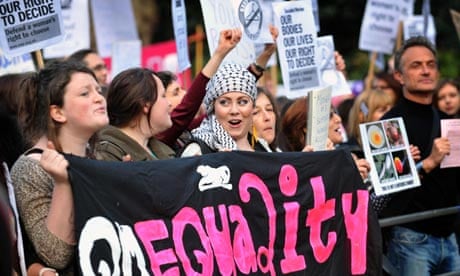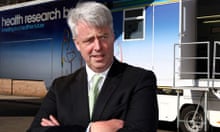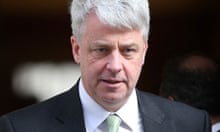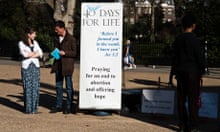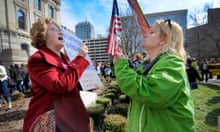It made a strange chorus: on the one side, a small crowd of Catholics, intoning the rosary and singing Ave Maria, while, a few metres away, a noisy gathering of campaigners banged drums, blew whistles and chanted slogans. The venue – a genteel Georgian square in the shadow of the British Museum, central London – was also perhaps unexpected.
But if the noisy standoff between hundreds of rival anti-abortion and pro-choice protesters on Friday night was peaceful and largely good-natured, it represented the latest salvo in an increasingly fraught battle over the issue, in what Britain's largest abortion provider has called "a new era" of challenges to abortion rights.
Activists from a group called 40 Days for Life have been holding daily prayer vigils in the square, outside a discreet clinic run by the British Pregnancy Advisory Service (BPAS). The campaign group is part of a US-based anti-abortion network established in 2004, which has co-ordinated protests in at least 14 countries.
The group claims its protests, usually attended by only a handful of activists, are "legal, peaceful and prayerful". But BPAS was forced to call the police earlier this month after women complained of being filmed entering the clinic, and a man from the West Midlands has pleaded guilty to hacking into the BPAS website. Vigils have been held elsewhere outside clinics; 170 people from another US-affiliated group called Helpers of God's Precious Infants held a protest outside an east London clinic earlier this month.
40 Days for Life says it does not encourage filming members of the public, but has tweeted about a number of successful "turnarounds" – women who have been persuaded not to enter the clinic thanks to their protests, which often feature signs, candles and plastic model foetuses.
The vigil has attracted counter-demonstrations on Sundays, when the clinic is closed, by pro-choice campaigners, and last night's larger rally, attended by about 300 Catholics including Alan Hopes, the auxiliary bishop of Westminster, provoked a similar response from pro-choice activists, who outnumbered the praying protesters perhaps two to one. Hopes said he intended to make a "principled and peaceful statement of opposition to our society's 'culture of death".
Katy Ladbrook, who works in publishing, said: "I've been in the pro-choice movement for 10 years and I'm really worried about these people. Although they look really benign, sitting here praying, in the US they have closed down clinics with their activities."
Maureen Cooper said she had attended "to defend the most important piece of legislation that's been passed in my lifetime. I'm old enough to know what it was like in the days before choice and what happened to women then. I campaigned for the Steel bill [which legalised abortion in 1967] and I'm horrified that it's having to happen again."
A few metres away, Francisco-Javier Muñoz, a lawyer originally from Spain, was praying. "We are here to pray for the human lives that are being killed, and also for the mothers." What of the argument that their protest might intimidate or cause distress to vulnerable women? "I think that is their personal conscience causing them distress."
Michael D'Arcy said he had attended "just to stand in solidarity with unborn children, really". His partner Laura Crowley said: "I don't think it's proper to characterise this as a woman's issue. A lot of unborn babies are unborn women."
While a rowdy, at times almost carnivalesque protest took place alongside them, the anti-abortion protesters stood or kneeled and prayed quietly, some clutching rosary beads. A pregnant woman kneeled in prayer next to a barrier, clutching her belly.
Hopes left at 8pm, surrounded by a tight circle of protective supporters. He refused to answer questions but released a statement, saying that where women had been persuaded not to have abortions, it was "a demonstration of God's grace – an outcome to be welcomed".
Darinka Aleksic of Abortion Rights, one of the organisers of the counter-rally, said: "There's certainly been a change of climate. , one of the organisers of the counter-rally. "There's a lot of concern about an alliance of interest between the government, which is seeking to restrict the right to choice possibly by an act on the time limit, but certainly in restricting advice to women and, on the ground, anti-choice protests like this one. It was really important that we marked our opposition to what's going on."
